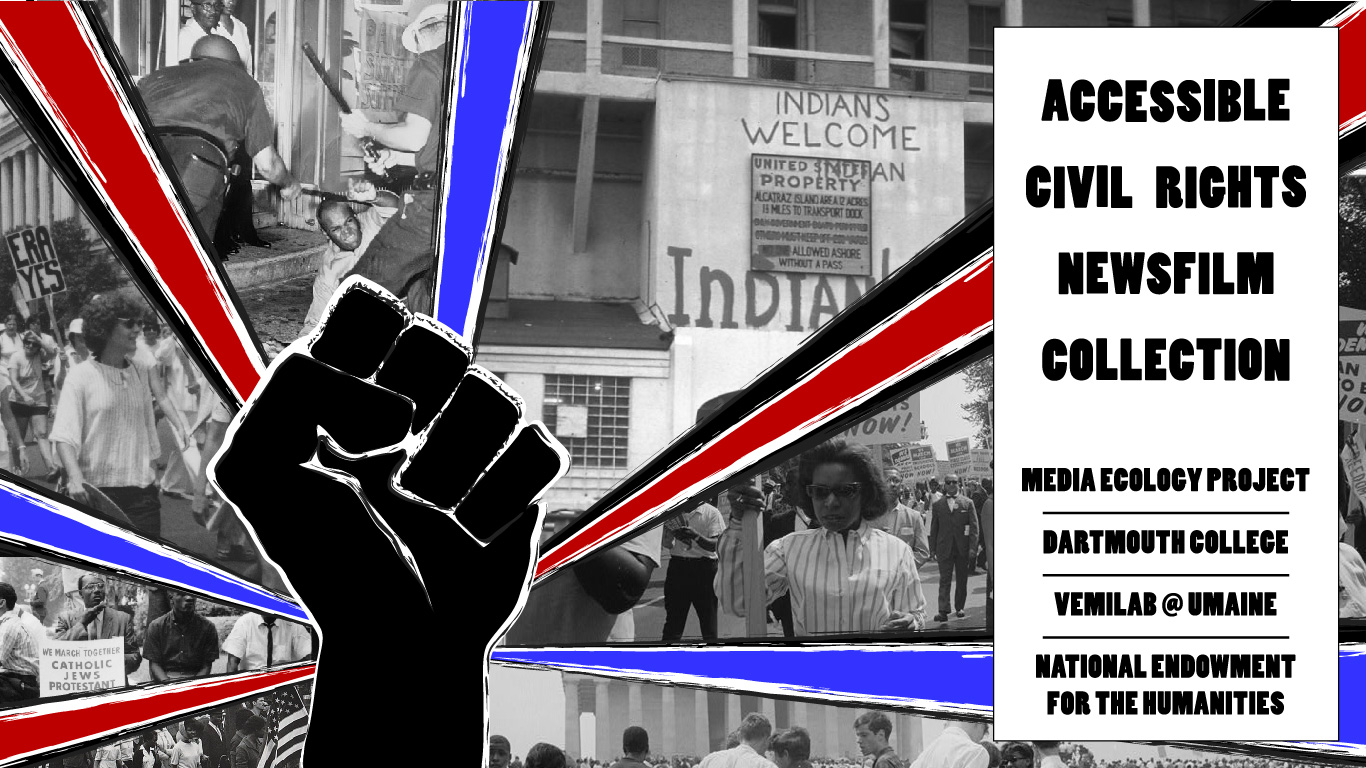
Dartmouth College’s Media Ecology Project (MEP) has received Research and Development funding from the National Endowment for the Humanities Preservation and Access office to build an accessible collection of newsfilm covering the civil rights movements of the 1950s-1980s. This research will be led by Prof. Mark Williams (Dartmouth Film & Media Studies), an expert in film and media studies, and Dr. John P. Bell (Dartmouth Research Information, Technology and Consulting), an expert on digital curation. Prof. Williams is the director of and Dr. Bell is the associate director for the Media Ecology Project at Dartmouth.
Newsfilm–often shot on site by local television news crews that only broadcast a fraction of what they recorded–is a largely untapped source that captured powerful moments throughout the emotionally-charged American civil rights era. The Accessible Civil Rights Heritage (ACRH) project will develop a test corpus of culturally significant American civil rights newsfilm compiled from moving image archives and regional historical societies across the U.S. ACRH will then explore new cataloging and access procedures that deliver high-quality, meaningful experiences to blind and visually impaired (BVI) users. Participating scholars include Jacqueline Stewart (U Chicago), Matthew Delmont (Dartmouth), and Desirée Garcia (Dartmouth). In addition, MEP will continue previous work with the Virtual Environment and Multimodal Interaction Lab (VEMI Lab) at the University of Maine to assess adaptive technology.
Accessible delivery of online video is a challenge that higher education has struggled to meet, leading to thousands of hours of video instruction being taken offline because the schools that created it could not provide equal access to all users. BVI students in particular may have trouble fully understanding primary video sources because the text or audio descriptions associated with them rarely convey the full meaning and context of the images on screen. ACRH will study how to write video annotations that better describe the contents of evocative videos and create adaptive technology that supports playing back those annotations audibly. The resulting guidelines and technology will be published as an open resource that all schools, museums, and archives can use to make their own video collections more accessible to BVI users. ACRH is a follow up to an NEH-funded 2015 collaboration between MEP and VEMI Lab that resulted in the Semantic Annotation Tool (SAT), a plugin that websites can use to annotate video that is compatible with screen reading software.
MEP is grateful to the following cultural heritage organizations for providing ACRH access to their newsfilm collections:
- The Bay Area Television Archive
- The Minnesota Historical Society
- The Mississippi Department of Archives and History
- The UCLA Film and Television Archive
- The University of Arkansas
- The University of Georgia
- The University of South Carolina
- WGBH
- The Wolfson Archive
ABOUT THE MEDIA ECOLOGY PROJECT
The Media Ecology Project (MEP) is a digital lab at Dartmouth College that supports enhanced scholarly access to archival film and video collections and the contribution of critical analysis back to the archival and research communities. MEP enables new critical insights on historical media by promoting interdisciplinary scholarship, methodological innovation, and technology development. More information on MEP is available at mediaecology.dartmouth.edu.
ABOUT THE VEMI LAB
The VEMI Lab at the University of Maine is an educational, research, and development facility based on a collaborative model where faculty, undergraduate, and graduate students across more than a dozen disciplines learn about scientific research, creative design, and technical skills using the latest virtual and augmented reality technologies. For more information about the VEMI lab, see umaine.edu/vemi/.
ABOUT THE NATIONAL ENDOWMENT FOR THE HUMANITIES
Created in 1965 as an independent federal agency, the National Endowment for the Humanities supports research and learning in history, literature, philosophy, and other areas of the humanities by funding selected, peer-reviewed proposals from around the nation. Additional information about the National Endowment for the Humanities and its grant programs is available at www.neh.gov.
